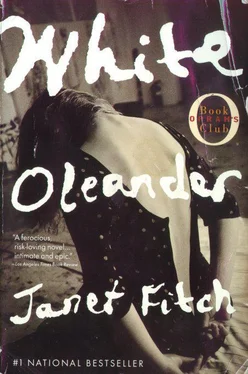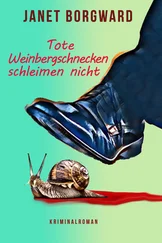Janet Fitch - White Oleander
Здесь есть возможность читать онлайн «Janet Fitch - White Oleander» весь текст электронной книги совершенно бесплатно (целиком полную версию без сокращений). В некоторых случаях можно слушать аудио, скачать через торрент в формате fb2 и присутствует краткое содержание. Жанр: Современная проза, на английском языке. Описание произведения, (предисловие) а так же отзывы посетителей доступны на портале библиотеки ЛибКат.
- Название:White Oleander
- Автор:
- Жанр:
- Год:неизвестен
- ISBN:нет данных
- Рейтинг книги:3 / 5. Голосов: 1
-
Избранное:Добавить в избранное
- Отзывы:
-
Ваша оценка:
- 60
- 1
- 2
- 3
- 4
- 5
White Oleander: краткое содержание, описание и аннотация
Предлагаем к чтению аннотацию, описание, краткое содержание или предисловие (зависит от того, что написал сам автор книги «White Oleander»). Если вы не нашли необходимую информацию о книге — напишите в комментариях, мы постараемся отыскать её.
White Oleander — читать онлайн бесплатно полную книгу (весь текст) целиком
Ниже представлен текст книги, разбитый по страницам. Система сохранения места последней прочитанной страницы, позволяет с удобством читать онлайн бесплатно книгу «White Oleander», без необходимости каждый раз заново искать на чём Вы остановились. Поставьте закладку, и сможете в любой момент перейти на страницу, на которой закончили чтение.
Интервал:
Закладка:
I walked up to the garbage can and looked inside. I could see her brown paper bag on top of the trash. It stank, they never washed out the cans, but I could do this. I pretended I had dropped something in the garbage, and grabbed the lunch sack. It held a tuna sandwich with pickle relish on buttered white bread. The crusts were cut off. There were carrot sticks and even a can of apple juice fortified with vitamin C.
Compared with clubbing your sled dogs, this was easy. I learned to watch when the bell rang, when everybody threw their lunches away and rushed back to class. I was always tardy fifth period. But my hands didn’t shake anymore.
Then one day I got busted. A girl pointed me out to her friend. “Look at that nasty girl. Eating garbage.” And they all turned to look at me. I could see myself in their eyes, my scarred face, gobbling up a thrown-away yogurt with my finger. I would have stopped going to school, but I wouldn’t have known where else to eat.
I found a library where I could safely pass the afternoons, looking at pictures in art books and sketching. I couldn’t read anymore, the words wouldn’t stay still. They drifted down the page, like roses on wallpaper. I drew samba figures on lined notebook paper, copied Michelangelo’s muscular saints and Leonardo’s wise Madonnas. I drew a picture of myself eating out of the garbage, furtive, with both hands, like a squirrel, and sent it to my mother. I got a letter back from her cellmate.
Dere Asrid,
You dont know me, I am your mamas roomayt. Your letters make her too sad. Send more chereful things, how youre getten strate A’s, homecome queen. Shes here for life. Why make it hardr.
youre frend Lydia GunmanWhy make it harder, Lydia? Because it was her fault I was there. I would spare her nothing.
My mother’s reply was more practical. She ordered me to call Children’s Services every day and yell my head off until they changed my placement. Her writing was big and dark and emphatic. I could feel her rage, I warmed myself by it. I needed her strength, her fire. “Don’t you let them forget about you,” she said.
But this was not about being forgotten. This was about being in a file cabinet with my name on it and they closed the door. I was a corpse with a tag on my toe.
AS I HAD NO MONEY, I panhandled in the liquor store parking lot and the supermarket, asking men for change so I could call social services. Men always took pity on me. A couple of times, I could have turned a trick. They were nice men who smelled good, men from offices who looked like they’d have been good for a fifty. But I didn’t want to start. I knew how it would play. I’d just buy a bunch of food and then be hungry again and also a whore. When you started thinking it was easy, you were forgetting what it cost.
AMELIA FOUND OUT I’d been asking for a new placement. I cringed on the uncomfortable wooden-edged sofa in the sitting room as she paced back and forth, ranting, her hands cutting the air. “How dare you tell such outrageous lies about my house! I treat you like my own daughter, and this is how you repay me? With these lies?” The whites of her eyes showed all around the black irises, and spittle accumulated in the corners of her thin lips. “You don’t like my house? I send you to Mac. See how well you eat there. You’re lucky I allow you to sit at the table with the other girls, with that hideous face. In Argentina you would not be allowed to walk through the front door.” My face. I felt my scars throb along my jaw.
“What do you know about a noble home? Just a common piece of street garbage. Mother in prison. You know, you stink like garbage. When you come into a room, the girls hold their breath. You soil my home. Your presence insults me. I don’t want to look at you.” She turned away, pointed to the polished stairway. “Go to your room and stay there.”
I stood but hesitated. “What about dinner?”
She turned on her patent leather heel, and laughed. “Maybe tomorrow.”
I lay on my bed in the beautiful bedroom smelling of cedar, my stomach clawing inside me like a cat in a sack. During the day, all I wanted to do was sleep, but at night, images of my days returned like a slide show. Did I really smell? Was I garbage, hideous?
I heard Silvana come in, settle on her bed. “You thought you were something special, eh? Some hot shit. Now you see, you’re no better than us. You better shut up, or you’ll end up at Mac.” She tossed a dinner roll onto my blanket.
I ate it in two bites. It was so good, I almost cried. “What’s Mac?” I asked.
I heard her exasperated sigh. “Mac’s where they put you when you got no place to go. You won’t last a day. They’ll eat you for breakfast, white girl.”
“Least they get breakfast,” I said.
Silvana chuckled in the dark.
A car went by outside, its headlights painting the ceiling in moving shadows. “Were you ever there?” I asked.
“Nidia,” she said. “Even she said it was tough, and she’s a loca. Better shut up and take it like everybody else. Remember, eighteen and out.”
But I was only fifteen.
NOW KIKI TORREZ was the pet, the one who sat on Amelia’s right and ate scraps off her plate like a dog. I was both envious and disgusted. It was Kiki who turned the pages of the Argentine scrapbooks and ate butter cookies, while I washed Amelia’s dirty underwear by hand in the sink, scrubbed her bathtub, ironed her clothes and her lace-edged linens, and if I got any idea to ruin anything out of spite, then no dinner.
She played us off one another. I stole a can of yams one night, and she made Kiki tell her who did it. I lost more weight, my ribs stuck out like the staves of a boat. I was beginning to understand how one human being could kill another.
“You should take in girls,” I heard her tell her friend Constanza one day while I was polishing the silver. “It’s easy money. You can remodel. I’m remodeling the bathroom next.”
I polished the intricate coils of the fork handle with a toothbrush. I’d done it yesterday, but she didn’t like that there was still tarnish in the crevices, so I had to redo them. I would have liked to plant it in her gut. I could have eaten her flesh raw.
Finally in the darkness of March, after weeks of near-daily phone calls, Ms. Cardoza dumped me and I got a new caseworker, an angel of the Lord called Joan Peeler. She was young, wore black, and had long hair dyed rock’n’roll red. She had four silver rings on each hand. She looked more like a poet than a government drone. When it was time to go for our visit, I asked if she knew any coffeehouses.
She took me to one on Vermont. We ducked in past a few outside tables occupied by shivering smokers trying to stay dry, and into the warm, humid interior. Immediately, I was overcome by memories, the black walls and fragrance of hippie soup, the table by the cash register cluttered with handbills and flyers and free newspapers. Even the laughably ugly paintings in thick pigments seemed familiar—green women with long breasts and vampire teeth, men with baroque erections. And I could remember my mother’s voice, her irritation when the roar of the cappuccino machine interrupted her reading, her books stacked on the table where I drew and took the money when someone bought one.
I wanted her back. I was overwhelmed with a need to hear her low, expressive voice. I wanted her to say something funny and cruel about the art, or tell a story about one of the other poets. I wanted to feel her hand on my hair, stroking me while she spoke.
Joan Peeler ordered peach tea. I took strong coffee with cream and sugar and the biggest pastry, a blueberry scone shaped like a heart. We sat at a table where we could see the street, the funereal umbrellas, hear the soft hiss of cars through puddles. She opened my case file on the sticky tabletop. I tried to eat slowly, to enjoy the buttery biscuit and the whole blueberries, but I was too hungry. I finished half of it before she even looked up.
Читать дальшеИнтервал:
Закладка:
Похожие книги на «White Oleander»
Представляем Вашему вниманию похожие книги на «White Oleander» списком для выбора. Мы отобрали схожую по названию и смыслу литературу в надежде предоставить читателям больше вариантов отыскать новые, интересные, ещё непрочитанные произведения.
Обсуждение, отзывы о книге «White Oleander» и просто собственные мнения читателей. Оставьте ваши комментарии, напишите, что Вы думаете о произведении, его смысле или главных героях. Укажите что конкретно понравилось, а что нет, и почему Вы так считаете.












